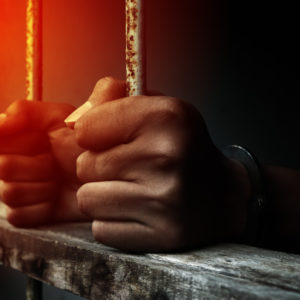Imagine being 13 years old. Your father has been in prison for as long as you can remember. Over time, the two of you slowly develop a relationship. Eventually, you are at a point where you want to give him a hug.
But as much as you’d like to, you can’t. Your father is more than 500 miles away because of existing policy in some of our country’s federal prisons.
For Kendall Williams, this is not a hypothetical — it’s reality. And like him, there are other family members who are far removed from their loved ones serving time repaying their debt to society. That’s why Williams and dozens more gathered at the U.S. Capitol a few weeks ago to demand change.
Fortunately, policymakers from across the ideological spectrum are taking notice.
Recently, the House of Representatives passed the FIRST STEP Act, bipartisan legislation that would require inmates to be placed in a prison within 500 miles of their homes. This is good news for people like Williams and his father. Research has shown that consistent familial connections help facilitate rehabilitation.
But family separation isn’t the only obstacle prisoners face on the road to rehabilitation, nor is it the only problem plaguing the U.S. criminal justice system.
The United States has the unfortunate distinction of having the highest incarceration rate in the world. And instead of being rehabilitated, most prisoners become hardened criminals. Facing limited options to find work and reintegrate themselves back into society upon release, more than 75 percent will be arrested within five years.
As a result, our criminal justice system is a revolving door costing taxpayers $80 billion each year. In fact, we spend more each year on correctional facilities than we do on the federal Department of Education.
The FIRST STEP Act includes a number of provisions that would help alleviate many of these problems.
The bill would expand the number of days a prisoner’s sentence could be reduced for good behavior. It also encourages inmates to sign up for more vocational and educational programs so they have skills to find employment and not become a repeat offender.
Tony Lewis Jr., a re-entry specialist, says this is one of the most significant aspects of the FIRST STEP Act. “Expanding training and education in the federal system is critical and pivotal. It is shameful that we don’t have more of a focus on that.”
Additionally, if the bill were signed into law, it would require the federal government to assist individuals obtaining proper identification — another critical tool to finding work and housing.
These criminal justice reforms are gaining momentum among the American public. A recent poll found that likely voters overwhelmingly approve of the FIRST STEP Act. When asked about reforms needed to our criminal justice system, 75 percent said it was an important issue for them heading into this year’s midterm election.
Meanwhile, new research by Florida State University found the incarcerated want to be rehabilitated and are eager for a second chance. According to the findings, prisoners want to work more, learn more and spend more time on personal relationships.
Of course, protecting our communities is vital. There are some prisoners who pose a threat to society and should never see the light of day. But there are also countless stories of prisoners who turn their lives over to a higher power or find a sense of purpose and direction while incarcerated.
John Koufus, a former prisoner who is now national director of Reentry Initiatives at Right on Crime, believes we must resist being impartial bystanders as the formerly incarcerated struggle to adjust upon being released: “(Former prisoners) are out in space. They have no idea of how to get back home or how to be productive. And if we don’t do what we need to do, they will commit more crimes.”
No one piece of legislation will address all the shortcomings of our complicated criminal justice system, but Congress is on the cusp of passing one of the most significant criminal justice reforms in a generation.
The House has done its part. Now it’s over to the Senate, where dwindling days on the legislative calendar and competing interests threaten to kill the bill before it can get to President Donald Trump, who has expressed strong support for the bill.
The families of the incarcerated, those serving time and the American people are ready for Congress to finally deliver.

